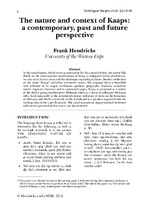| dc.contributor.author | Hendricks, Frank | |
| dc.date.accessioned | 2020-11-05T13:28:46Z | |
| dc.date.available | 2020-11-05T13:28:46Z | |
| dc.date.issued | 2016 | |
| dc.identifier.citation | Hendricks,F. (2016). The nature and context of Kaaps: a contemporary, past and future perspective. Multilingual Margins, 3(2): 6-39 | en_US |
| dc.identifier.issn | 2663-4848 | |
| dc.identifier.uri | http://hdl.handle.net/10566/5365 | |
| dc.description.abstract | In this contribution, which serves as orientation for this special edition, the accent falls
chiefly on the contemporary manifestation of Kaaps as colloquial variety of Afrikaans,
but also on its historic roots and the challenges regarding its future. Besides a reflection
on the name “Kaaps” and other alternative names, this language form is described
with reference to its origin, traditional speakers, geographic situation, sociolectic
nature, linguistic character and its contextual usages. Kaaps is presented as a variety
of the dialect group Southwestern Afrikaans which as a form of colloquial Afrikaans
refers back historically to the seventeenth century influence of slaves on the formation
of Afrikaans and which is currently chiefly manifested as a sociolect associated with the
working class of the Cape Peninsula. The social assessment, lingua-political treatment
and survival potential of this variety are also reviewed. | en_US |
| dc.language.iso | en | en_US |
| dc.publisher | University of the Western Cape | en_US |
| dc.subject | Kaaps | en_US |
| dc.subject | Cape Peninsula | en_US |
| dc.title | The nature and context of Kaaps: a contemporary, past and future perspective | en_US |
| dc.type | Article | en_US |

